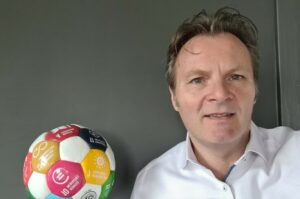Frank Landman – column nr. 1 Introduction
Looking back at my career path, it has never been just one thing. I’ve always developed and challenged myself through every chance I got, even though sometimes that meant I had a busy schedule and I traveled to various places around the world. Only now, when I look back at things, I see that many of my choices belong together and are follow-ups of one another.
During my jobs in municipalities and consultancy, I was always involved in international business. I have always been attracted to a broad perspective of the world and how everything feels connected. So, I guess unknowingly, I chose those jobs and additional council positions for a reason. My experiences in Africa, in Langenberg, for example, came from those choices, and I’m very grateful that I can share them with you now.
A beautiful and impactful memory I have from my early years there is a visit to a local township called Nkqubela. We walked by a shop that sold engraved glasses. All of them said ‘New York’ and ‘Paris’. The owner knew these are famous places, so he thought it would be great for people to buy those glasses here. When I asked him why he never engraved his own township’s name, he didn’t understand. Why would people want to buy that? He totally forgot the value of his own hometown, and it took some effort to make him realize this.
I once visited a beautiful dance group in Zolani Township In South Africa. Those kids were dancing on an old floor and the entrance was just a hole in the wall. The clothes they were wearing were the only clothes they had. One of the dancers made an enormous impression on all of us, his dancing touched our hearts. Sometime later, I found out he got the chance to compete in the South-African ballet competition. He won gold and got a scholarship at the Alvin Ailey Dance Theatre in New York. This boy with the name Mthuthuzeli is now an example for all the people in townships who believed there was no way out and no future.
What I’ve learned in the townships that I visited, is the feeling of Ubuntu. The group helps the individual, and the individual helps the group. In every possible way. However, the word Ubuntu only came to me years later, when Desmond Tutu visited the Netherlands to raise awareness about the Medical Knowledge Institute (MKI). During his prayer, he told us about the ‘we-mindset’, which denotes ‘I am because we are’. That was the moment I knew we needed this mindset, called Ubuntu, in the Netherlands on a macro and microscale.

Sometime later, I was invited to a conference on the topic SDGs (Sustainable Development Goals). I asked myself: “What can I implement from these goals in my municipality?” I realized I had to get my goals clear and bring focus to my organization if I wanted to get results. Everything just started to come together at that point, and soon I found the analogy with Ubuntu. ‘Local for the world and the world for local.’ As a municipality you can’t achieve it by yourself, so you have to stick together, both with the world around you and with the people in your town. However, I also had to keep in mind that what you do with one SDG, always influences another one. So you have to anticipate what influences each other and act according to that.
“About the SDG’s. It’s an United Nations strategic agenda of 17 goals adopted by 193 countries. The intention is to achieve those goals by 2030 to become a more sustainable, social and developed world for everyone in every country.”
In 2018, we were announced as the most promising SDG municipality in the Netherlands, and in 2019 we actually became the most inspiring one in the country. In that directive position, I was able to make an impact on many people in our own municipality, but looking back at all the stages and congresses I was invited to after this award, we also inspired many people around us. I decided to take the leap and start my own business, to further spread the knowledge and experiences about SDGs to institutes, municipalities and other organizations.
One important message I always share with my audience is this one: “You can never start with implementing just ‘a couple’ of SDGs in your business. Not even if you have the aim of increasing the number of SDGs over time. As soon as you start, you have to commit to all of them. And most importantly, you have to take a deeper look and create a deeper understanding of the whole chain that you are part of. Only then will you be able to stay clear from unwanted and unexpected negative spinoffs. By doing this, you can make the right impact on a social, economic and sustainable level. We have to realize this balance is necessary because our ecological footprint is getting worse every day and more and more people need to visit food banks every year.
But as with everything, it’s easier said than done. That’s why I’m currently working on a new conceptual framework, which also focuses on a deeper layer of global understanding; sentiment. And underneath that: feelings and emotions as a guiding approach to making a true connection in the world. But as space and time are limited, I’d be happy to share more about that and many more of my experiences with Ubuntu and SDGs in the next edition.





0 Comments